Let me tell you the story of a line that was held
And many men and women whose courage we know well
As they held the line at Peekskill on that lone September day
We will hold the line forever 'til the people have their way.
Spoken (Howard Fast):
My name is Howard Fast. I'm here to tell you the story of Peekskill. You see, there are actually two Peekskills. Two concerts. Two Fascist attacks. And I was at both. You won't get the true story from the daily press or the radio, so we're putting it on record for you now. Here are the facts.
Spoken (woman):
You are invited to a summer concert with Paul Robeson. Pete Seeger, Hope Foye, Joan Schlesinger and George Walker, presented hy People's Artists, for the benefit of the Harlem Chapter of the Civil Rights Congress, Sunday, August 27, 1949, at the Lakeland Picnic Grove, Peekskill, New York.
Howard Fast:
More facts. The Klan elements in Westchester County threatened violence. Police protection was asked. Four deputies showed up to watch 700 so called veterans attack the early picnickers. These 700 hoodlums closed the only exits, and for three hours they were kept from killing the women and children by a brave group of 39 men and boys, Negro and white. Before the police came, the mob had smashed the rented chairs and burned our music, while they shouted anti-Negro and anti-Semitic epithets, and boasted that they would finish Hitler's job.
Sung:
Hold the line, hold the line,
As we held the line at Peekskill we will hold it everywhere.
Hold the line, hold the line
We will hold the line forever 'til there's freedom everywhere.
Fred Hellerman:
My name is Freddy Hellerman of People's Artists. I want to tell you how the entire nation was aroused by the Peekskill outrage. The Westchester Committee for Law and Order invited People's Artists to return to Peekskill and have their concert. Well, we did go back on September 4th. It was Labor Day, and we went back 25,000 strong, while 4,000 trade unionists. most of them real veterans, formed a protective guard. We held our concert with Paul Robeson, and Pete Seeger and Hope Foye, Lee Hambro, George Allen, and Joan Schlesinger, and it was a beautiful day, a fine performance, and a victory for all Americans.
Paul Robeson (recording):
...instead of cryin'. we must keep fightin', until we're dyin'
And Old Man River, he'll just keep rollin' along, (applause)
Sung:
When the music was all over, we started to go home.
We did not know the trouble and the pain that was to come.
We got into our buses and drove out through the gate
And saw the gangster police, their faces filled with hate.
And without any warning, the rocks began to come
The cops and troopers laughed to see the damage that was done.
They ran us through the gauntlet, to their everlasting shame.
And the cowards there attacked us. their nation knew their shame.
(Insults, epithets, etc. in the background)
Howard Fast:
That's the sound of Fascism. Not in Germany, but here in America. Remember it!
(More shouts and epithets)
Pete Seeger:
This is Pete Seeger. I was there, too. There were 900 police, deputies and state troopers at Peekskill. They allowed the mob to form along a four mile line of road, and directed all traffic down this only exit, and then stood by watching while the hoodlums threw rocks through the windows of cars and buses. Heads were bashed in, eyes were cut by flying glass. Cars were overturned, and the people in them dragged out and beaten! And the police stood by and laughed! Hoodlum gangs went on a night long reign of terror all through Westchester County clear down to 210th Street and Broadway. Then the police moved! They moved into the picnic grounds lo beat up the trade union guards.
Howard Fast:
Over 160 wounded were reported at hospitals. One trade unionist, for example, had his nose pulverized, his skull fractured, and lost the sight of one eye permanently. Protests have heen pouring in to Dewey from all over the country. District Attorney Finnelli reportetl to Governor Dewey, "Police should be commended for their excellent work!" And Governor Dewey said to Mr. Finnelli. "The police did an excellent job. The Communists provoked this. Uh, you investigate the riot, Mr. Finnelli." But at a great mass meeting to protest Peekskill, Paul Robeson gave our answer: "These Klan-inspired and police-condoned hoodlums cannot stop the song of freedom in America! We are going on singing and presenting our concerts in every corner of America. Let's fight together!"
Sung:
All across the nation we are telling you this tale
You can marvel at the concert and know we have not failed.
We shed our blood at Peckskill and suffered many a pain
But we beat back the fascists and we'll beat them back again!
Hold the line, hold the line.
We will hold the line forever 'til there's freedom everywhere!
And many men and women whose courage we know well
As they held the line at Peekskill on that lone September day
We will hold the line forever 'til the people have their way.
Spoken (Howard Fast):
My name is Howard Fast. I'm here to tell you the story of Peekskill. You see, there are actually two Peekskills. Two concerts. Two Fascist attacks. And I was at both. You won't get the true story from the daily press or the radio, so we're putting it on record for you now. Here are the facts.
Spoken (woman):
You are invited to a summer concert with Paul Robeson. Pete Seeger, Hope Foye, Joan Schlesinger and George Walker, presented hy People's Artists, for the benefit of the Harlem Chapter of the Civil Rights Congress, Sunday, August 27, 1949, at the Lakeland Picnic Grove, Peekskill, New York.
Howard Fast:
More facts. The Klan elements in Westchester County threatened violence. Police protection was asked. Four deputies showed up to watch 700 so called veterans attack the early picnickers. These 700 hoodlums closed the only exits, and for three hours they were kept from killing the women and children by a brave group of 39 men and boys, Negro and white. Before the police came, the mob had smashed the rented chairs and burned our music, while they shouted anti-Negro and anti-Semitic epithets, and boasted that they would finish Hitler's job.
Sung:
Hold the line, hold the line,
As we held the line at Peekskill we will hold it everywhere.
Hold the line, hold the line
We will hold the line forever 'til there's freedom everywhere.
Fred Hellerman:
My name is Freddy Hellerman of People's Artists. I want to tell you how the entire nation was aroused by the Peekskill outrage. The Westchester Committee for Law and Order invited People's Artists to return to Peekskill and have their concert. Well, we did go back on September 4th. It was Labor Day, and we went back 25,000 strong, while 4,000 trade unionists. most of them real veterans, formed a protective guard. We held our concert with Paul Robeson, and Pete Seeger and Hope Foye, Lee Hambro, George Allen, and Joan Schlesinger, and it was a beautiful day, a fine performance, and a victory for all Americans.
Paul Robeson (recording):
...instead of cryin'. we must keep fightin', until we're dyin'
And Old Man River, he'll just keep rollin' along, (applause)
Sung:
When the music was all over, we started to go home.
We did not know the trouble and the pain that was to come.
We got into our buses and drove out through the gate
And saw the gangster police, their faces filled with hate.
And without any warning, the rocks began to come
The cops and troopers laughed to see the damage that was done.
They ran us through the gauntlet, to their everlasting shame.
And the cowards there attacked us. their nation knew their shame.
(Insults, epithets, etc. in the background)
Howard Fast:
That's the sound of Fascism. Not in Germany, but here in America. Remember it!
(More shouts and epithets)
Pete Seeger:
This is Pete Seeger. I was there, too. There were 900 police, deputies and state troopers at Peekskill. They allowed the mob to form along a four mile line of road, and directed all traffic down this only exit, and then stood by watching while the hoodlums threw rocks through the windows of cars and buses. Heads were bashed in, eyes were cut by flying glass. Cars were overturned, and the people in them dragged out and beaten! And the police stood by and laughed! Hoodlum gangs went on a night long reign of terror all through Westchester County clear down to 210th Street and Broadway. Then the police moved! They moved into the picnic grounds lo beat up the trade union guards.
Howard Fast:
Over 160 wounded were reported at hospitals. One trade unionist, for example, had his nose pulverized, his skull fractured, and lost the sight of one eye permanently. Protests have heen pouring in to Dewey from all over the country. District Attorney Finnelli reportetl to Governor Dewey, "Police should be commended for their excellent work!" And Governor Dewey said to Mr. Finnelli. "The police did an excellent job. The Communists provoked this. Uh, you investigate the riot, Mr. Finnelli." But at a great mass meeting to protest Peekskill, Paul Robeson gave our answer: "These Klan-inspired and police-condoned hoodlums cannot stop the song of freedom in America! We are going on singing and presenting our concerts in every corner of America. Let's fight together!"
Sung:
All across the nation we are telling you this tale
You can marvel at the concert and know we have not failed.
We shed our blood at Peckskill and suffered many a pain
But we beat back the fascists and we'll beat them back again!
Hold the line, hold the line.
We will hold the line forever 'til there's freedom everywhere!
inviata da Dead End - 23/8/2012 - 10:42
×
![]()

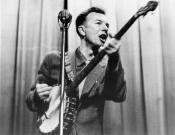
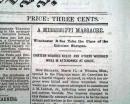
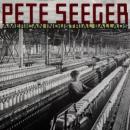

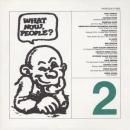

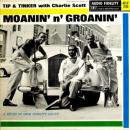

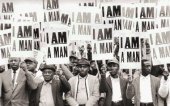
Voce narrante: Howard Fast, che poi su quegli eventi scrisse pure un libretto intitolato “Peekskill, U.S.A.”
Interpreti: Pete Seeger (che suona anche il banjo), Lee Hays, Fred Hellerman e Ronnie Gilbert.
Musica: sulla melodia di Hold the Line scritta da Pete Seeger e Lee Hays.
La voce di Paul Robeson fu registrata a Peekskill proprio il 4 settembre 1949 da Francis Dellorco, così come pure i rumori di sottofondo che si riferiscono alle aggressioni dei gruppi di fascisti e razzisti.
Testo trovato su Folk Archive.
La star della serata doveva essere niente meno che Paul Robeson, il possente baritono nero e fieramente comunista che aveva appena dichiarato che i neri americani non avrebbero mai combattuto contro l’Unione Sovietica nel caso di scontro tra gli opposti blocchi.
Gli spettatori arrivati in massa per il concerto si trovarono circondati da una “mob” furiosa armata di sassi e di mazze da baseball, spalleggiata dalla polizia locale, che urlava slogan razzisti e fascisti.
La macchina di Robeson fu bloccata ad uno dei posti di blocco organizzati dai fa(s)cinorosi ed il concerto non potè tenersi.
Ma il grande Robeson non era uno da darsi per vinto. Coinvolse altri musicisti, tra cui Pete Seeger e Woody Guthrie, e con l’aiuto di sindacati ed associazioni organizzò un potente servizio d’ordine che riuscì a garantire il regolare svolgimento del meeting nello stesso luogo una settimana più tardi, il 4 settembre. Tuttavia l’organizzazione non potè garantire la sicurezza degli intervenuti a concerto concluso: sulle strade del ritorno musicisti e spettatori, tra i quali donne, bambini e vecchi, furono aggrediti, insultati, picchiati, bastonati e presi a sassate, molti furono costretti a passare la notte all’addiaccio circondati dagli aggressori.
Le immagini di Eugene Bullard, il primo pilota militare nero, veterano pluridecorato della Prima Guerra, selvaggiamente picchiato da manifestanti e poliziotti fecero scalpore in tutta America, ma nessuno fu mai incriminato per quei fatti, anzi: il Dipartimento di Stato ritirò il passaporto a Paul Robeson, quel sovversivo cantante negro.
“Hold The Line”, canterà Pete Seeger: resistete, non fate un passo indietro, tenete fermo; “come abbiamo resistito a Peekskill, resisteremo in tutta l’America fino a quando potremo respirare la libertà nel vento”.
(fonte: Alessandro Portelli da “Note americane – Musica e culture negli Stati Uniti”, Shake edizioni, 2011)
Sui “Peekskill Riots” del 1949 si vedano anche le canzoni Ballad of Paul Robeson, My Thirty Thousand e la già citata Hold the Line.